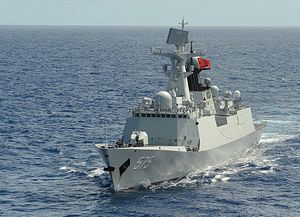In 2016, the United States challenged excessive maritime claims by flying aircraft and sailing ships through waters claimed by a range of Asian countries, including Cambodia, China, India, Indonesia, Japan, Malaysia, Maldives, Pakistan, the Philippines, South Korea, Taiwan, Thailand, and Vietnam. According to the U.S. Department of Defense’s annual report (PDF) on freedom of navigation (FON), U.S. military assets challenged claims by the previously listed states between October 1, 2015, and September 30, 2016.
That interval notably includes the first three of four total freedom of navigation operations conducted by the Obama administration in the South China Sea, near features occupied by China. All those operations received heavy international coverage, with most of the focus in reports centering around the U.S. challenge to excessive Chinese maritime claims. However, as the FON report makes clear, the United States does not differentiate between ally, partner, and adversary when it comes to assertion of freedom of navigation under international law.
With China, the report stresses a range of excessive claims. Specifically, the United States challenged “Excessive straight baselines; jurisdiction over airspace above the EEZ; restriction on foreign aircraft flying through an Air Defense Identification Zone (ADIZ) without the intent to enter national airspace; domestic law criminalizing survey activity by foreign entities in the EEZ; prior permission required for innocent passage of foreign military ships through the TTS.” In the period covered in the FON report, the United States challenged Chinese claims specifically near the Paracel and Spratly Islands.
What’s notable is that every claimant in the complex web of maritime and territorial disputes in the South China Sea — including the Philippines, a U.S. treaty ally, and Taiwan and Vietnam, U.S. partners — had excessive claims challenged by the United States. Indeed, the basis of U.S. policy in the South China Sea has been support for international law and freedom of navigation and overflight. Washington has to date taken no stance on the sovereignty of individual features, which would determine the sovereign status of specific entitlements.
A press release accompanying the release of the FON report notes that the United States tries to be “comprehensive [and] even-handed… challenging excessive maritime claims based on principle rather than identity of the coastal State asserting the claim.” This existing policy is why several Asian maritime watchers (myself included) were alarmed when U.S. Secretary of State Rex Tillerson, during his confirmation hearing, hinted that he would support a rethinking of that policy to specifically discriminate against Chinese claims and deny Beijing access to its holdings. (Tillerson since clarified his remarks and no change appears imminent for the moment.)
In any case, the release of the annual FON report serves as an important corrective to the often misperceived role of U.S. operations in the South China Sea and elsewhere in the Asia-Pacific. Even without having ratified the United Nations Convention on the Law of the Sea, the U.S. Navy treats its provisions as the basis of customary law, preserving freedom of navigation for civilian and military vessels alike in the region. China also claims to support freedom of navigation, but, in the South China Sea especially, distinguishes between FON for civilian commercial vessels and military assets. Under UNCLOS, foreign military vessels are free to conduct regular activities, including surveillance and exercises within the exclusive economic zone, but are restricted from non-‘innocent’ activities within the territorial sea of a coastal state.































